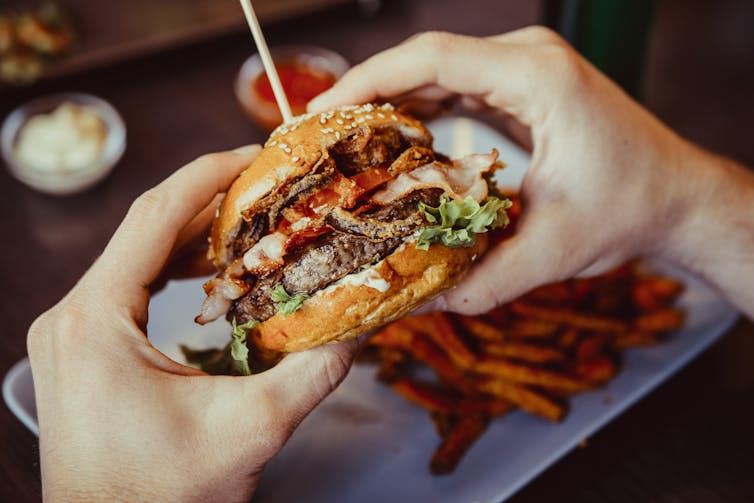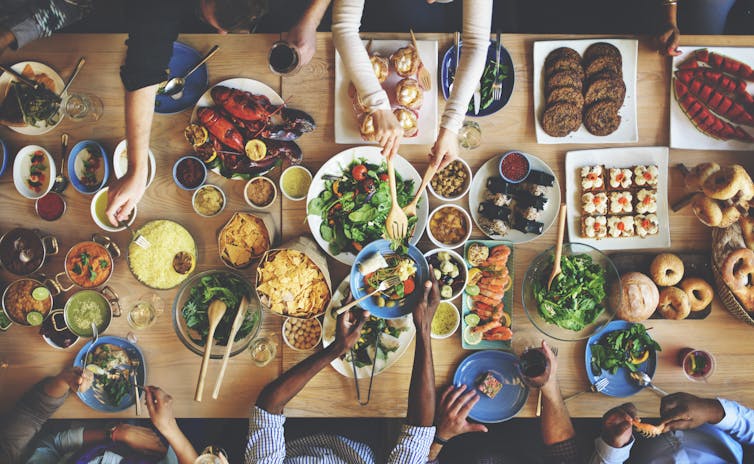Since the beginning of the pandemic, it’s been suggested that certain foods or diets may offer protection against COVID-19. But are these sorts of claims reliable?
A recent study published in BMJ Nutrition, Prevention and Health sought to test this hypothesis. It found that health professionals who reported following diets that are vegetarian, vegan or pescatarian (those that exclude meat but include fish) had a lower risk of developing moderate-to-severe COVID-19.
Additionally, the study found that those who said they eat a low-carbohydrate or high-protein diet seemed to have an increased risk of contracting moderate-to-severe COVID-19.
This may make it sound like certain food preferences – such as being vegetarian or a fish eater – may benefit you by reducing the risk of COVID-19. But in reality, things aren’t so clear.
Self-reporting and small samples
First, it’s important to underline that reported diet type didn’t influence the initial risk of contracting COVID-19. The study isn’t suggesting that diet changes the risk of getting infected. Nor did it find links between diet type and length of illness. Rather, the study only suggests that there’s a link between diet and the specific risk of developing moderate-to-severe COVID-19 symptoms.
It’s also important to consider the actual number of people involved. Just under 3,000 health professionals took part, spread across six western countries, and only 138 developed moderate-to-severe disease. As each person placed their diet into one of 11 categories, this left a very small number eating certain types of diet and then even smaller numbers getting seriously ill.

It’s hard to assess the true quality of people’s diets without monitoring what they actually eat. veryulissa/Shutterstock
This meant, for instance, that fish eaters had to be grouped together with vegetarians and vegans to produce meaningful results. In the end only 41 vegetarians/vegans contracted COVID-19 and only five fish eaters got the disease. Of these, just a handful went on to develop moderate-to-severe COVID-19. Working with such small numbers increases the risk of a falsely identifying a relationship between factors when there isn’t one – what statisticians call a type 1 error.
Then there is another problem with studies of this type. It’s observational only, so can only suggest theories about what is happening, rather than any causality of diet over the effects of COVID-19. To attempt to show something is actually causal, you ideally need to test it as an intervention – that is, get someone to switch to doing it for the study, give it time to show an effect, and then compare the results with people who haven’t had that intervention.
This is how randomised controlled trials work and why they are considered the best source of evidence. They are a much more robust method of testing whether one single thing is having an effect on something else.
Plus, there is also the problem that the diet people say they consume may not be what they actually eat. A questionnaire was used to find out what foods people ate specifically, but responses to this were also self-reported. It also had only 47 questions, so subtle but influential differences in people’s diets may have gone unnoticed. After all, the foods available in the US do differ from those available in Spain, France, Italy, the UK and Germany.
So what does this tell us?
When it comes to trying to determine the best diet for protecting against COVID-19, the truth is we don’t have enough quality data – even with the results of this study, which are a small data set and only observational.
And a further issue is that the study didn’t look at the quality of people’s diets by assessing which foods they actually ate. This is another reason why it needs treating with caution. Self-declared diet types or food questionnaires may not capture information on the variety and type of foods eaten – for instance missing details about how much fresh or processed food someone eats, how meals are eaten and with whom. And as alluded to above, self-reported data on what people eat is also notoriously inaccurate.
The bottom line is: the name of what you call your diet is far less important than what you actually eat. Just because a diet is vegetarian or pescatarian doesn’t automatically make it healthy.

Eating a varied, balanced diet is a route to general good health. Rawpixel.com/Shutterstock
For now, the robust evidence isn’t there to suggest that being vegetarian or pescatarian protects against COVID-19 – so there’s no need to rush to switch your diet as a result of this study. However, what we do know is that keeping active, eating a sensible healthy diet and keeping our weight in check helps to fortify us against a wide range of health issues, and this could include COVID-19.
Perhaps the best advice is simply to keep following general dietary guidelines: that is, that we should eat a variety of foods, mainly vegetables, fruit, pulses, nuts, seeds and whole grains, with few highly processed foods that are high in sugar, salt and fat.



 Viking Therapeutics Sees Growing Strategic Interest in $150 Billion Weight-Loss Drug Market
Viking Therapeutics Sees Growing Strategic Interest in $150 Billion Weight-Loss Drug Market  Sanofi to Acquire Dynavax in $2.2 Billion Deal to Strengthen Vaccines Portfolio
Sanofi to Acquire Dynavax in $2.2 Billion Deal to Strengthen Vaccines Portfolio  Federal Appeals Court Blocks Trump-Era Hospital Drug Rebate Plan
Federal Appeals Court Blocks Trump-Era Hospital Drug Rebate Plan  Sanofi to Acquire Dynavax in $2.2 Billion Deal to Strengthen Vaccine Portfolio
Sanofi to Acquire Dynavax in $2.2 Billion Deal to Strengthen Vaccine Portfolio  U.S. Vaccine Policy Shifts Under RFK Jr. Create Uncertainty for Pharma and Investors
U.S. Vaccine Policy Shifts Under RFK Jr. Create Uncertainty for Pharma and Investors  Novo Nordisk and Eli Lilly Cut Obesity Drug Prices in China as Competition Intensifies
Novo Nordisk and Eli Lilly Cut Obesity Drug Prices in China as Competition Intensifies  China to Add Eli Lilly’s Mounjaro to National Health Insurance in 2025
China to Add Eli Lilly’s Mounjaro to National Health Insurance in 2025  FDA Approves Mitapivat for Anemia in Thalassemia Patients
FDA Approves Mitapivat for Anemia in Thalassemia Patients  California Jury Awards $40 Million in Johnson & Johnson Talc Cancer Lawsuit
California Jury Awards $40 Million in Johnson & Johnson Talc Cancer Lawsuit  U.S. and Rwanda Sign $228 Million Health Partnership to Boost Self-Reliance
U.S. and Rwanda Sign $228 Million Health Partnership to Boost Self-Reliance  Novo Nordisk Stock Surges After FDA Approves Wegovy Pill for Weight Loss
Novo Nordisk Stock Surges After FDA Approves Wegovy Pill for Weight Loss 






























